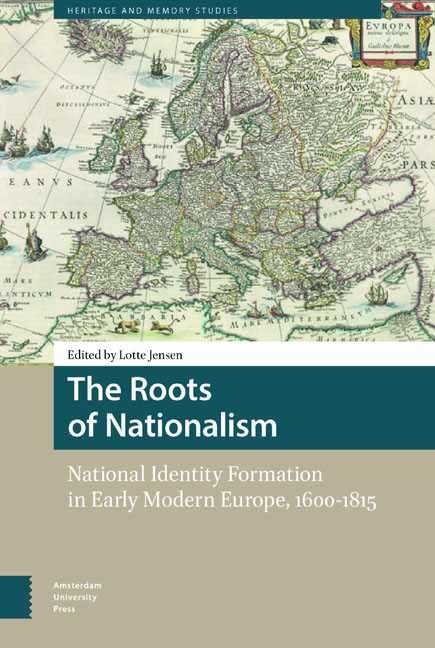Book contents
- Frontmatter
- Contents
- The Roots of Nationalism: Introduction
- Part One The Modernist Paradigm Contested
- Part Two The Genealogy of National Identity
- Part Three Negative Mirror Imaging
- Part Four Maps, Language and Canonisation
- Part Five Nation in the Age of Revolution
- List of Illustrations
- List of Contributors
- Index
5 - Arngrímur Jónsson and the Mapping of Iceland
Published online by Cambridge University Press: 03 February 2021
- Frontmatter
- Contents
- The Roots of Nationalism: Introduction
- Part One The Modernist Paradigm Contested
- Part Two The Genealogy of National Identity
- Part Three Negative Mirror Imaging
- Part Four Maps, Language and Canonisation
- Part Five Nation in the Age of Revolution
- List of Illustrations
- List of Contributors
- Index
Summary
Balancing over the fissure between a state of dependency and the rise of Icelandic self-awareness, the Icelandic historiographer Arngrímur Jónsson (1568-1648) succeeded in writing a history of Iceland that could hold its ground with contemporary historiographical works. From the tenth until the early thirteenth century, Iceland had known a socio-political structure consisting of chieftainries. After a brief period of internal political instability, it became a dependency of Norway, whose governance of Iceland was passed into Danish hands after the Kalmar Union of 1397, a situation that would last until Iceland's independence in 1944. Following the assumption of control over Iceland in 1262-64 by the Norwegian crown, the output of saga literature – Iceland's literary pride – dwindled throughout the fourteenth century, and despite the rise of rímur poetry, nothing that could be considered the saga's equal had emerged. That is, until the second half of the sixteenth century. In a time when European rulers engaged historiographers to write national histories that recorded their realms’ and/or dynastic, if not personal, glory on paper, the opportunity to revive Iceland's former literary – and historical – glory presented itself. King Christian IV and scholars from Denmark started taking an avid interest in literary sources available only in Iceland, which could corroborate or extend information from their own sources and thereby enable them to record Danish history. They sought the help of an Icelandic scholar, who had brought the existence of such sources to their attention, to make them available and translate them. In doing so, they inadvertently provided the scholar in question with all of the material needed to write a history of Iceland. Thus, Icelandic literature and Icelandic history would rise again, be it in Latin, in the only internationally acknowledged form of historiography at that time.
Arngrímur Jónsson was the man who brought this resurgence about. He was not the first Icelandic historiographer, but he was the most significant of his era. He had studied at the University in Copenhagen from 1585 until 1589 and produced a description of Iceland titled Brevis Commentarius de Islandia in 1593, a defence in Latin against a foreign work that had depicted Iceland negatively. This was the text that aroused the interest of Danish scholars in Icelandic sources and led to Arngrimur's working together with Denmark's foremost scholars and royal historiographers.
- Type
- Chapter
- Information
- The Roots of NationalismNational Identity Formation in Early Modern Europe, 1600–1815, pp. 109 - 134Publisher: Amsterdam University PressPrint publication year: 2016



